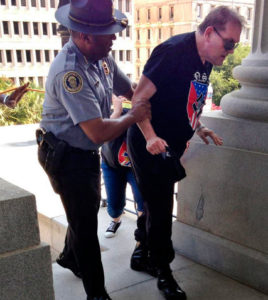
Two years ago next Saturday, white supremacist Dylann Roof was welcomed into a Bible Study at Emanuel African Methodist Episcopal Church, and shot dead 9 people, including the church’s senior pastor, State Senator Clementa Pinckney.
The tragedy set off a remarkable chain of events.
First, the relatives of the victims expressed forgiveness towards Roof only days later, at the hearing to set his bond. Read their anguished, redemptive statements HERE. Their Christian forgiveness takes my breath away, humbles me. I don’t know if I could do the same.
Second, at long last, the Confederate flag, which Roof had taken as his symbol, was removed from the South Carolina State House grounds, and moved to a museum, where it belongs.
At a white supremacist rally to protest the flag removal, a third remarkable thing happened, and that’s the story I want to tell here.
LeRoy Smith was the director of the South Caroline Department of Public Safety, and he was working the rally that day to support his subordinates. It was a hot day, and Smith noticed an older white man who appeared to be overcome by the heat.
The white man was wearing a T-shirt emblazoned with a swastika.
Leroy Smith is African-American. He had every reason to hate white supremacists. The rally had turned nasty, with catcalls between protesters and counter-protesters, some jostling, even some bottle-throwing. So, Smith had his hands full, and had every excuse to ignore the white man’s distress. But that’s not what he did.
Smith gently took the man’s arm, and slowly walked up him the steps and into the air-conditioned State House, murmuring reassurance and encouragement.
Photos of the two men went viral on the media. When asked why he thinks the photos were so impactful, Smith responded, “Love. I think that’s the greatest thing in the world- love. And that’s why so many people were moved by it.” (Read the full New York Times report of the incident HERE)
If a black man can show compassion for a white supremacist, then surely we can love each other in spite of our political differences. I call that radical love. I challenge you this week to go out of your way to show radical love to someone who has hurt you, or someone whose political views are abhorrent to you.
